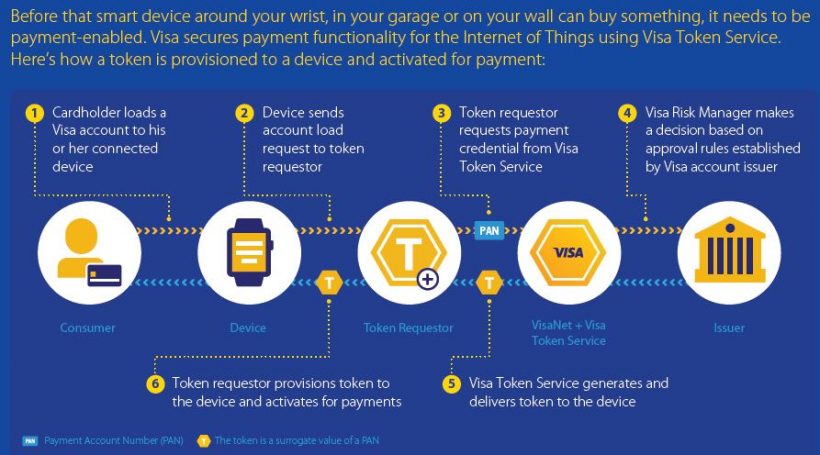Cryptocurrency can become a new micropayment automation tool.
The Internet of things is a very voluminous field that is constantly evolving. Now this segment can be attributed millions of connected devices. Some of them are equipped with an electronic payment system, which can be called m2m-payments. In the future, this trend will only increase, and the number of Internet devices capable of performing this kind of transaction will increase.

Analytical agency Gartner cites the opinion of its specialists, according to which by 2020 the number of IoT gadgets should exceed 20 billion. This is a lot, and the main regions of their concentration, according to Research Nester , can be called the Asia-Pacific region (46% of the total such devices), North America - 24% and Europe - 20%. It is estimated that the total capitalization of the IoT market will increase to $ 724 billion.
Well, since in Asia, cryptocurrencies are becoming more and more familiar method of calculation between the various participants in sales transactions, most likely, it is here that cryptographic tokens will become the new m2m-payment tool. Japan is gradually taking the necessary steps for this, South Korea, despite some difficulties, is also moving in this direction. China is not far behind, gradually removing the restrictions imposed earlier.
Traditional payment platforms, even the largest ones, like Visa and MasterCard, are already looking for opportunities and methods of working with cryptocurrencies. Now these companies are conducting experiments, launching pilot projects in order to present something completely new to the public in the future, where not Fiat, but cryptocurrency will play the main role. For example, software solutions are offered for wearable devices such as smart watches, smartphones, bracelets and others.

Well, and where is the Internet of things and smart devices? The fact is that already now some household gadgets can pay for something on their own. For example, the same advanced refrigerators, which check their content and order the missing products. And not only they. In the future, it will be possible to see the counters paying bills from the energy companies, the household chemicals ordering system and everything else that might be useful at home.
So far, cryptocurrencies for these purposes can be used far from everywhere - there is no legislative basis. Some countries prohibit bitcoin and altcoins, others suspend cryptocurrencies while drafting laws to regulate this sphere. But the current pace of development of the "crypt" is such that everything said above is just around the corner.
The most interesting thing is that very few network users own a cryptocurrency. According to Coinbase and ARK Invest from 2016, there are only about 7 million people around the world. But since 2016, much has changed. Now these 7 million can be safely multiplied by 10, or even by 30. Anyway, it is still very small. Over time, the crypt system will become more common among ordinary users.
But even now the volume of the cryptocurrency market amounts to hundreds of billions of US dollars. The more people will get their wallets, the more voluminous financial crypto flows will become. In this mass and will be conducted m2m-transaction.
For the convenience of users, devices are already being produced that can serve as a means of calculating cryptocurrency. One of them is Finney smartphones , which, according to the developers, can become a safe cryptocurrency repository with the ability to carry out incoming and outgoing transactions. With regard to the device mentioned above, paying for electricity bills, then such a project already exists. The startup SatoshiPay agreed with Visa on the development of smart lamps, which will pay for the electricity they consume.
Naturally, solutions of this kind should provide for the existence of different limits and restrictions for smart systems that pay for something. Otherwise, situations are possible when some overly zealous gadget starts to throw the owner's money down the drain, paying for something unnecessary. If m2m-payments become a reality, then they can be used as a worthy alternative to existing payment platforms and funds.
The merits of cryptocurrency are aware of an increasing number of states. Even a conservative Iran has recently said that , subject to the regulation of cryptocurrency, the country will be able to accept Bitcoin and work with it without any problems. The benefit to Iran is quite tangible - a state that is under sanctions will be able to avoid using the dollar. There are no legislative norms, according to which the use of Bitcoin is prohibited. One of the high-ranking officials of the country said that now the government is seriously engaged in the preparation of infrastructure for a new means of payment.

In the meantime, the rate of Bitcoin and other cryptocurrencies is growing by leaps and bounds, more and more interested participants will come to this area.


Analytical agency Gartner cites the opinion of its specialists, according to which by 2020 the number of IoT gadgets should exceed 20 billion. This is a lot, and the main regions of their concentration, according to Research Nester , can be called the Asia-Pacific region (46% of the total such devices), North America - 24% and Europe - 20%. It is estimated that the total capitalization of the IoT market will increase to $ 724 billion.
Well, since in Asia, cryptocurrencies are becoming more and more familiar method of calculation between the various participants in sales transactions, most likely, it is here that cryptographic tokens will become the new m2m-payment tool. Japan is gradually taking the necessary steps for this, South Korea, despite some difficulties, is also moving in this direction. China is not far behind, gradually removing the restrictions imposed earlier.
Traditional payment platforms, even the largest ones, like Visa and MasterCard, are already looking for opportunities and methods of working with cryptocurrencies. Now these companies are conducting experiments, launching pilot projects in order to present something completely new to the public in the future, where not Fiat, but cryptocurrency will play the main role. For example, software solutions are offered for wearable devices such as smart watches, smartphones, bracelets and others.

Well, and where is the Internet of things and smart devices? The fact is that already now some household gadgets can pay for something on their own. For example, the same advanced refrigerators, which check their content and order the missing products. And not only they. In the future, it will be possible to see the counters paying bills from the energy companies, the household chemicals ordering system and everything else that might be useful at home.
So far, cryptocurrencies for these purposes can be used far from everywhere - there is no legislative basis. Some countries prohibit bitcoin and altcoins, others suspend cryptocurrencies while drafting laws to regulate this sphere. But the current pace of development of the "crypt" is such that everything said above is just around the corner.
The most interesting thing is that very few network users own a cryptocurrency. According to Coinbase and ARK Invest from 2016, there are only about 7 million people around the world. But since 2016, much has changed. Now these 7 million can be safely multiplied by 10, or even by 30. Anyway, it is still very small. Over time, the crypt system will become more common among ordinary users.
But even now the volume of the cryptocurrency market amounts to hundreds of billions of US dollars. The more people will get their wallets, the more voluminous financial crypto flows will become. In this mass and will be conducted m2m-transaction.
For the convenience of users, devices are already being produced that can serve as a means of calculating cryptocurrency. One of them is Finney smartphones , which, according to the developers, can become a safe cryptocurrency repository with the ability to carry out incoming and outgoing transactions. With regard to the device mentioned above, paying for electricity bills, then such a project already exists. The startup SatoshiPay agreed with Visa on the development of smart lamps, which will pay for the electricity they consume.
Naturally, solutions of this kind should provide for the existence of different limits and restrictions for smart systems that pay for something. Otherwise, situations are possible when some overly zealous gadget starts to throw the owner's money down the drain, paying for something unnecessary. If m2m-payments become a reality, then they can be used as a worthy alternative to existing payment platforms and funds.
The merits of cryptocurrency are aware of an increasing number of states. Even a conservative Iran has recently said that , subject to the regulation of cryptocurrency, the country will be able to accept Bitcoin and work with it without any problems. The benefit to Iran is quite tangible - a state that is under sanctions will be able to avoid using the dollar. There are no legislative norms, according to which the use of Bitcoin is prohibited. One of the high-ranking officials of the country said that now the government is seriously engaged in the preparation of infrastructure for a new means of payment.

In the meantime, the rate of Bitcoin and other cryptocurrencies is growing by leaps and bounds, more and more interested participants will come to this area.

All Articles